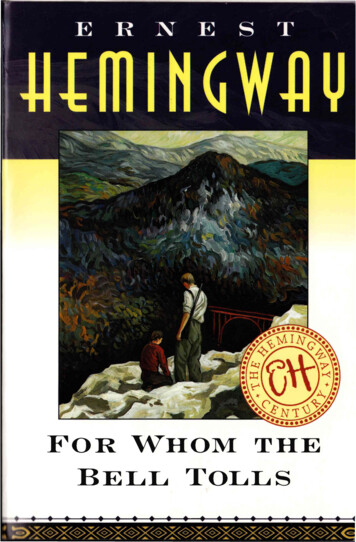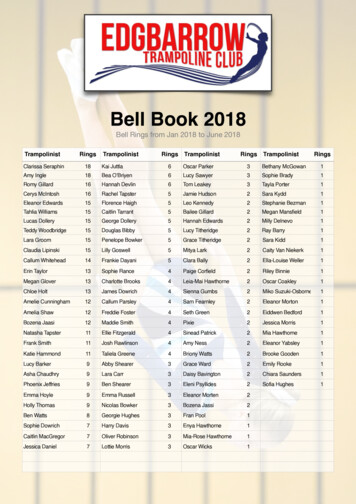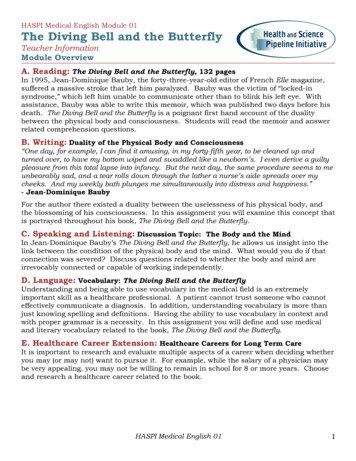
Transcription
FOR WHOM THEBELL TOLLS 4
In 1937 Ernest Hemingway traveled to Spain to cover the civil warthere for the North American Newspaper Alliance. Three yearslater he completed the greatest novel to emerge from "the goodfight," For Whom the Bell Tolls. The story of Robert Jordan, a youngAmerican in the International Brigades attached to an antifascist guerillaunit in the mountains of Spain, it tells of loyalty and courage, love anddefeat, and the tragic death of an ideal. In his portrayal of Jordan's love forthe beautiful Maria and his superb account of El Sordo's last stand, in hisbrilliant travesty of La Pasionaria and his unwillingness to believe in blindfaith, Hemingway surpasses his achievement in The Sun Also Rises and AFarewell to Arms to create a work at once rare and beautiful, strong andbrutal, compassionate, moving, and wise. "If the function of a writer is toreveal reality," Maxwell Perkins wrote Hemingway after reading the man uscript, "no one ever so completely performed it." Greater in power,broader in scope, and more intensely emotional than any of the author'sprevious works, it stands as one of the best war novels of all time.ERN EST HEM I N G WAY did more to change the style of Englishprose than any other writer in the twentieth century, and for his efforts hewas awarded the Nobel Prize for Literature in 1954. Hemingway wrote inshort, declarative sentences and was known for his tough, terse prose.Publication of The Sun Also Rises and A Farewell to Arms immediatelyestablished Ernest Hemingway as one of the greatest literary lights of thetwentieth century. Part of the expatriate community of Paris in the 1920s,the former journalist and World War I ambulance driver began a career thatled to international fame. Hemingway was an aficionado of bullfightingand big-game hunting, and his main protagonists were always men andwomen of courage and conviction, who suffered unseen scars, both phys ical and mental. He died in 1961.m SCRIBNERPAPERBACKPublished by Simon & Schuster New YorkFICTIONICover design by Cheung TaiCover illustration by Pamela Patrick9 780684 803357U.S. 13.00Can. 19.2507951300.-'".'/,,/ISBN, / ,,""./ "x ///0-684-80335-6 .-/, /---// .x. /'' X.-' x.4'
-- -
Books by Ernest HemingwayTHE COMPLETE SHORT STORIESTHE GARDEN OF EDENDATELINE: TORONTOTHE DANGEROUS SUMMERSELECTED LETTERSTHE ENDURING HEMINGWAYTHE NICK ADAMS STORIESISLANDS IN THE STREAMTHE FIFTH COLUMN AND FOUR STORIES OF THE SPANISH CIVIL WARBY-LINE: ERNEST HEMINGWAYA MOVEABLE FEASTTHREE NOVELSTHE SNOWS OF KILIMANJ ARO AND OTHER STORIESTHE HEMINGWAY READERTHE OLD MAN AND THE SEAACROSS THE RIVER AND INTO THE TREESFOR WHOM THE BELL TOLLSTHE SHORT STORIES OF ERNEST HEMINGWAYTO HAVE AND HAVE NOTGREEN HILLS OF AFRICAWINNER TAKE NOTHINGDEATH IN THE AFTERNOONIN OUR TIMEA FAREWELL TO ARMSMEN WITHOUT WOMENTHE SUN ALSO RISESTHE TORRENTS OF SPRING
ERNESTHEMINGWAYFOR WHOMTHE BELLTOLLSSCRIBNER PAPERBACK FrCTIO),;"PUBLISHED BY SIMO),;" & SCHUSTERYEW YORKLO),;"DONTORONTOSYDNEYTOKYOSINGAPORE
SCRIBNER PAPERBACK FICTIONSimon & Schuster Inc.Rockefeller Center1230 Avenue of the AmericasNew York, NY 10020This book is a work of fiction. Names, characters, places, andincidents either are products of the author's imagination or are usedfictitiously. Any resemblance to actual events or locales or persons,living or dead, is entirely coincidental.Copyright 1940 by Ernest HemingwayCopyright renewed 1968 by Mary HemingwayAll rights reserved, including the right of reproductionin whole or in part in any form.First Scribner Paperback Fiction Edition 1995SCRIBNER PAPERBACK FICTION and design are trademarks ofJossey-Bass, Inc., used under license bySimon&Schuster, the publisher of this work.910
This book is forMARTHA GELLHORN
No man is an Iland, intire of it selfe; every manis a peece of the Continent, a part of the maine; i f aClod bee washed away by the Sea, Europe is the lesse,as well as if a Promontorie were, as well as i f a Mannorof thy friends or of thine owne were; any mans deathdiminishes me, because I am involved in Mankinde; Andtherefore never send to know for whom the bell tolls;JOHN DONNEIt tolls for thee.
CHAPTER ONEHE LAY flat on the brown, pine-needled floor of the forest, his chinon his folded arms, and high overhead the wind blew in the tops ofthe pine trees. The mountainside sloped gently where he lay; butbelow it was steep and he could see the dark of the oiled road wind ing through the pass. There was a stream alongside the road and fardown the pass he saw a mill beside the stream and the falling waterof the dam, white in the summer sunlight."Is that the mill?" he asked."Yes,""I do not remember it.""It was built since you were here. The old mill is farther down;much below the pass."He spread the photostated military map out on the forest floor andlooked at it carefully. The old man looked over his shoulder. He wasa short and solid old man in a black peasant's smock and gray iron stiff trousers and he wore rope-soled shoes. He was breathing heavilyfrom the climb and his hand rested on one of the two heavy packsthey had been carrying."Then you cannot see the bridge from here.""No," the old man said. "This is the easy country of the pass wherethe stream flows gently. Below, where the road turns out of sight inthe trees, it drops suddenly and there is a steep gorge-""I remember.""Across this gorge is the bridge.""And where are their posts?""There is a post at the mill that you see there."The young man, who was studying the country, took his glassesfrom the pocket of his faded, khaki flannel shirt, wiped the lenseswith a handkerchief, screwed the eyepieces around until the boardsof the mill showed suddenly clearly and he saw the wooden benchbeside the door; the huge pile of sawdust that rose behind the openshed where the circular saw was, and a stretch of the flume that
Erne s t Hemingway2brought the logs down from the mountainside on the other bank ofthe stream. The stream showed clear and smooth-looking in theglasses and, below the curl of the falling water, the spray from thedam was blowing in the wind."There is no sentry.""There is smoke coming from the millhouse," the old man said."There are also clothes hanging on a line.""I see them but I do not see any sentry.""Perhaps he is in the shade," the old man explained. "It is hot therenow. He would be in the shadow at the end we do not see.""Probably. Where is the next post?""Below the bridge. It is at the roadmender's hut at kilometer fivefrom the top of the pass.""How many men are here?" He pointed at the mill."Perhaps four and a corporal.""And below?""More.Iwill find out.""And at the bridge?""Always two. One at each end.""We will need a certain number of men," he said. "How manymen can you get?""I can bring as many men as you wish," the old man said. "Thereare many men now here in the hills.""How many?""There are more than a hundred. But they are in small bands.How many men will you need?""Iwill let you know when we have studied the bridge.""Do you wish to study it now?""No. Now I wish to go to where we will hide this explosive untilit is time. I would like to have it hidden in utmost security at adistance no greater than half an hour from the bridge, if that ispossible.""That is simple," the old man said. "From where we are going, itwill all be downhill to the bridge. But now we must climb a little inseriousness to get there. Are you hungry?""Yes," the young man said. "But we will eat later. How are youcalled? I have forgotten."gotten.Itwas a bad sign to him that he had for
FORWHOMTH E B E L L T O L L S3"Anselmo," the old man said. "I am called Anselmo and I comefrom Barco de Avila. Let me help you with that pack."The young man, who was tall and thin, with sun-streaked fair hair,and a wind- and sun-burned face, who wore the sun-faded flannelshirt, a pair of peasant's trousers and rope-soled shoes, leaned over,put his arm through one of the leather pack straps and swung theheavy pack up onto his shoulders. He worked his arm through theother strap and settled the weight of the pack against his back. Hisshirt was still wet from where the pack had rested."I have it up now," he said. "How do we go?""We climb," Anselmo said.Bending under the weight of the packs, sweating, they climbedsteadily in the pine forest that covered the mountainside. There wasno trail that the young man could see, but they were working up andaround the face of the mountain and now they crossed a small streamand the old man went steadily on ahead up the edge of the rockystream bed. The climbing now was steeper and more difficult, untilfinally the stream seemed to drop down over the edge of a smoothgranite ledge that rose above them and the old man waited at thefoot of the ledge for the young man to come up to him."How are you making it?""All right," the young man said. He was sweating heavily and histhigh muscles were twitchy from the steepness of the climb."Wait here now for me. I go ahead to warn them. You do not wantto be shot at carrying that stuff.""Not even in a joke," the young man said. "Is it far?""It is very close. How do they call thee?""Roberto," the young man answered. He had slipped the pack offand lowered it gently down between two boulders by the streambed."Wait here, then, Roberto, and I will return for you.""Good," the young man said. "But do you plan to go down thisway to the bridge?""No. When we go to the bridge it will be by another way. Shorterand easier.""I do not want this material to be stored too far from the bridge.""You will see. If you are not satisfied, we will take another place.""We will see," the young man said.
Ernest Hemingway4He sat by the packs and watched the old man climb the ledge. Itwas not hard to climb and from the way he found hand-holds with out searching for them the young man could see that he had climbedit many times before. Yet whoever was above had been very carefulnot to leave any trail.The young man, whose name was Robert Jordan, was extremelyhungry and he was worried. He was often hungry but he was notusually worried because he did not give any importance to whathappened to himself and he knew from experience how simple itwas to move behind the enemy lines in all this country. It was assimple to move behind them as it was to cross through them, if youhad a good guide. It was only giving importance to what hap pened to you if you were caught that made it difficult; that anddeciding whom to trust. You had to trust the people you workedwith completely or not at all, and you had to make decisions aboutthe trusting. He was not worried about any of that. But there wereother things.This Anselmo had been a good guide and he could travel wonder fully in the mountains. Robert Jordan could walk well enough him self and he knew from following him since before daylight that theold man could walk him to death. Robert Jordan trusted the man,Anselmo, so far, in everything except judgment. He had not yet hadan opportunity to test his judgment, and, anyway, the judgment washis own responsibility. No, he did not worry about Anselmo and theproblem of the bridge was no more difficult than many other prob lems. He knew how to blow any sort of bridge that you could nameand he had blown them of all sizes and constructions. There wasenough explosive and all equipment in the two packs to blow thisbridge properly even if it were twice as big as Anselmo reported it, ashe remembered it when he had walked over it on his way to LaGranja on a walking trip in 1933, and as Golz had read him the de scription of it night before last in that upstairs room in the house out side of the Escorial."To blow the bridge is nothing," Golz had said, the lamplight onhis scarred, shaved head,pointing with a pencil on the big map. "Youunderstand' ""Yes, I understand.""Absolutely nothing. Merely to blow the bridge is a failure."
FORWHOMTHE BEL L TOLLS5"Yes, Comrade General. ""To blow the bridge at a stated hour based on the time set for theattack is how it should be done. You see that naturalIy. That is yourright and how it should be done."Golz looked at the pencil,then tapped his teeth with it.Robert Jordan had said nothing."You understand that is your right and how it should be done,"Golz went on, looking at him and nodding his head. He tapped onthe map now with the pencil. "That is how I should do it. That iswhat we cannot have. ""Why, Comrade General?""Why?" Golz said, angrily. "How many attacks have you seen andyou ask me why? What is to guarantee that my orders are notchanged? What is to guarantee that the attack is not annulled? Whatis to guarantee that the attack is not postponed? What is to guaranteethat it starts within six hours of when it should start? Has any attackever been as it should?""It wilI start on time if it is your attack," Robert Jordan said."They are never my attacks," Golz said. "I make them. But theyare not mine. The artillery is not mine. I must put in for it. I havenever been given what I ask for even when they have it to give.That is the least of it. There are other things. You know how thosepeople are. It is not necessary to go into all of it. Always there issomething. Always some one will interfere. So now be sure youunderstand. ""So when is the bridge to be blown?" Robert Jordan had asked."After the attack starts. As soon as the attack has started and notbefore. So that no reinforcements will come up over that road. " Hepointed with his pencil. "I must know that nothing wilI come up overthat road.""And when is the attack?""I will tell you. But you are to use the date and hour only as anindication of a probability. You must be ready for that time. Youwill blow the bridge after the attack has started. You see?" he in dicated with the pencil. "That is the only road on which they canbring up reinforcements. That is the only road on which they canget up tanks, or artillery, or even move a truck toward the passwhich I attack. I must know that bridge is gone. Not before, so it
6ErnestHemingwaycan be repaired if the attack is postponed. No. It must go when theattack starts and I must know it is gone. There are only two sentries.The man who will go with you has just come from there. He is avery reliable man, they say. You will see. He has people in the moun tains. Get as many men as you need. Use as few as possible, but useenough. I do not have to tell you these things. ""And how do I determine that the attack has started?""It is to be made with a full division. There will be an aerial bom bardment as preparation. You are not deaf, are you?""Then 1 may take it that when the planes unload, the attack hasstarted?""You could not always take it like that," Golz said and shook hishead. "But in this case, you may. It is my attack. ""I understand it," Robert Jordan had said. "I do not say I like itvery much. ""Neither do I like it very much. If you do not want to undertake it,say so now. If you think you cannot do it, say so now. ""I will do it," Robert Jordan had said. "I will do it all right. ""That is all I have to know," Golz said. "That nothing comes upover that bridge. That is absolute. ""I understand. ""I do not like to ask people to do such things and in such a way,"Golz went on. "I could not order you to do it. I understand what youmay be forced to do through my putting such conditions. 1 explainvery carefully so that you understand and that you understand all ofthe possible difficulties and the importance. ""And how will you advance on La Granja if that bridge isblown?""We go forward prepared to repair it after we have stormed thepass. It is a very complicated and beautiful operation. As complicatedand as beautiful as always. The plan has been manufactured inMadrid. It is another of Vicente Rojo, the unsuccessful professor's,masterpieces. I make the attack and I make it, as always, not in suffi cient force. It is a very possible operation, in spite of that. I am muchhappier about it than usual. It can be successful with that bridgeeliminated. We can take Segovia. Look, I show you how it goes. Yousee? It is not the top of the pass where we attack. We hold that. It ismuch beyond. Look- Here- Like this--"
F OR W HOM T H EB EL LTOL LS7"I would rather not know," Robert Jordan said."Good," said Golz. "It is less of baggage to carry with you on theother side,yes?""I would always rather not know. Then, no matter what can hap pen, it was not me that talked.""It is better not to know," Golz stroked his forehead with the pen cil. "Many times I wish I did not know myself. But you do know theone thing you must know about the bridge?""Yes. I know that.""I believe you do," Golz said. "I will not make you any littlespeech. Let us now have a drink. So much talking makes me verythirsty, Comrade Hordan. You have a funny name in Spanish, Com rade Hordown.""How do you say Golz in Spanish, Comrade General?""Hotze," said Golz grinning, making the sound deep in histhroat as though hawking with a bad cold. "Hotze," he croaked."Comrade Heneral Khotze. If I had known how they pronouncedGolz in Spanish I would pick me out a better name before I cometo war here. When I think I come to command a division and Ican pick out any name I want and I pick out Hotze. HeneralHotze. Now it is too late to change. How do you likework?" It was thepartizanRussian term for guerilla work behind thelines."Very much," Robert Jordan said. He grinned. "It is very healthyin the open air.""I like it very much when I was your age, too," Golz said. "Theytellme youblow bridges very well. Very scientific. It is only hearsay.I have never seen you do anything myself. Maybe nothing ever hap pens really. You really blow them? " he was teasing now. "Drinkthis," he handed the glass of Spanish brandy to Robert Jordan. "Youreallyblow them?""Sometimes.""Youbetter not have any sometimes on this bridge. No, let usnot talk any more about this bridge. You understand enough nowabout that bridge. We are very serious so we can make very strongjokes.Look, do you have many girls on the other side of thelines?""No, there is no time for girls."
8ErnestHemingway"I do not agree. The more irregular the service, the more ir regular the life. You have very irregular service. Also you need ahaircut.""I have my hair cut as it needs it," Robert Jordan said. He wouldbe damned if he would have his head shaved like Golz. "I haveenough to think about without girls," he said sullenly."What sort of uniform am I supposed to wear?" Robert Jordanasked."None," Golz said. "Your haircut is all right. I tease you. You arevery different from me," Golz had said and filled up the glassesagam."You never think about only girls. I never think at all. Why shouldI? I amGeneral Sovietique. Inever think. Do not try to trap me intothinking. "Some one on his staff, sitting on a chair working over a map on adrawing board, growled at him in the language Robert Jordan didnot understand."Shut up," Golz had said, in English. "I joke if I want. I am so se rious is whyIcan joke. Now drink this and then go. You under stand, huh?""Yes," Robert Jordan had said. "I understand."They had shaken hands and he had saluted and gone out to thestaff car where the old man was waiting asleep and in that car theyhad ridden over the road past Guadarrama, the old man still asleep,and up the Navacerrada road to the Alpine Club hut where he,Rebert Jordan, slept for three hours before they started.That was the last he had seen of Golz with his strange whiteface that never tanned, his hawk eyes, the big nose and thin lipsand the shaven head crossed with wrinkles and with scars. Tomor row night they would be outside the Escorial in the dark along theroad; the long lines of trucks loading the infantry in the darkness;the men, heavy loaded, climbing up into the trucks; the machine gun sections lifting their guns into the trucks; the tanks being runup on the skids onto the long-bodied tank trucks; pulling the Di vision out to move them in the night for the attack on the pass. Hewould not think about that. That was not his business. That wasGolz's business. He had only one thing to do and that was whathe should think about and he must think it out clearly and take
FORWHOMTH E B ELL TOLLS9everything as it came along, and not worry. To worry was as badas to be afraid. It simply made things more difficult.He sat no by the stream watching the clear water flowingbetween the rocks and, across the stream, he noticed there was athick bed of watercress. He crossed the stream, picked a doublehandful, washed the muddy roots clean in the current and then satdown again beside his pack and ate the clean, cool green leaves andthe crisp, peppery-tasting stalks. He kneltby the streamand,pushing his automatic pistol around on his belt to the small of hisback so that it would not be wet, he lowered himself with a handon each of two boulders and drank from the stream. The waterwas achingly cold.Pushing himself up on his hands he turned his head and saw theold man coming down the ledge. With him was another man, also ina black peasant's smock and the dark gray trousers that were almost auniform in that province, wearing rope-soled shoes and with a car bine slung over his back. This man was bareheaded. The two ofthem came scrambling down the rock like goats.They came up to him and Robert Jordan got to his feet."Sa Iud, Camarada,"he said to the man with the carbine andsmiled."Salud, "the other said, grudgingly. Robert Jordan looked at theman's heavy, beard-stubbled face. It was almost round and his headwas round and set close on his shoulders. His eyes were small and settoo wide apart and his ears were small and set close to his head. Hewas a heavy man about five feet ten inches tall and his hands and feetwere large. His nose had been broken and his mouth was cut at onecorner and the line of the scar across the upper lip and lower jawshowed through the growth of beard over his face.The old man nodded his head at this man and smiled."He is the boss here," he grinned,then flexed his arms as though tomake the muscles stand out and looked at the man with the carbinein a half-mocking admiration."I"A very strong man. "can see it," Robert Jordan said and smiled again. He did notlike the look of this man and inside himself he was not smiling atall."What have you to justify your identity? " asked the man with thecarbine.
10Ernest HemingwayRobert Jordan unpinned a safety pin that ran through his pocketflap and took a folded paper out of the left breast pocket of his flan nel shirt and handed it to the man, who opened it, looked at it doubt fully and turned it in his hands.So he cannot read, Robert Jordan noted."Look at the seal," he said.The old man pointed to the seal and the man with the carbinestudied it, turning it in his fingers."What seal is that?""Have you never seen it?""No.""There are two," said Robert Jordan. "One is S. 1. M., the service ofthe military intelligence. The other is the General Staff.""Yes, I have seen that seal before. But here no one commands butme," the other said sullenly. "What have you in the packs?""Dynamite," the old man said proudly. "Last night we crossed thelines in the dark and all day we have carried this dynamite over themountain.""Ican use dynamite," said the man with the carbine. He handedback the paper to Robert Jordan and looked him over. "Yes. I haveuse for dynamite. How much have you brought him evenly. "The dynamite is for another purpose. What is yourname?""What is that to you?""He is Pablo," said the old man. The man with the carbine lookedat them both sullenly."Good. I have heard much good of you," said Robert Jordan."What have you heard of me?" asked Pablo."I have heard that you are an excellent guerilla leader, that you areloyal to the republic and prove your loyalty through your acts, andthat you are a man both serious and valiant. I bring you greetingsfrom the General Staff.""Where did you hear all this?" asked Pablo. Robert Jordan regis tered that he was not taking any of the flattery."Iheard it from Buitrago to the Escorial," he said, naming all thestretch of country on the other side of the lines."I know no one in Buitrago nor in Escorial," Pablo told him.
F O RW HO M T H EBE L LT O LLSII"There are many people on the other side of the mountains whowere not there before. Where are you from?""Avila. What are you going to do with the dynamite?""Blow up a bridge. ""What bridge?""That is my business.""If it is in this territory, it is my business. You cannot blow bridgesclose to where you live. You must live in one place and operate in an other. I know my business. One who is alive, now, after a year, knowshis business.""This is my business," Robert Jordan said. "We can discuss it to gether. Do you wish to help us with the sacks?""No," said Pablo and shook his head.The old man turned toward him suddenly and spoke rapidly and fu riously in a dialect that Robert Jordan could just follow.It was like read ing Quevedo. Anselmo was speaking old Castilian and it wentsomething like this,"Art thou a brute?Yes.Art thou a beast?Yes,manytimes. Hast thou a brain? Nay. None. Now we come for something ofconsummate importance and thee,with thy dwelling place to be undis turbed,puts thy fox-hole before the interests of humanity. Before the in terests of thy people. I this and that in the this and that of thy father. Ithis and that and that in thy this.Pick up that bag. "Pablo looked down."Every one has to do what he can do according to how it can betruly done," he said. "I live here and I operate beyond Segovia. If youmake a disturbance here, we will be hunted out of these mountains.It is only by doing nothing here that we are able to live in thesemountains. It is the principle of the fox.""Yes," said Anselmo bitterly. "It is the principle of the fox when weneed the wolf. ""I am more wolf than thee," Pablo said and Robert Jordan knewthat he would pick up the sack."Hi. Ho . . . ," Anselmo looked at him. "Thou art more wolf thanme and I am sixty-eight years old. "He spat on the ground and shook his head."You have that many years?" Robert Jordan asked, seeing thatnow, for the moment, it would be all right and trying to make it goeaSler.
12ErnestHemingway"Sixty-eight in the month of July.""If we should ever see that month," said Pablo. "Let me help youwith the pack," he said to Robert Jordan. "Leave the other to the oldman." He spoke, not sullenly, but almost sadly now. "He is an oldman of great strength.""I will carry the pack," Robert Jordan said."Nay," said the old man. "Leave it to this other strong man.""I will take it," Pablo told him, and in his sullenness there was asadness that was disturbing to Robert Jordan. He knew that sadnessand to see it here worried him."Give me the carbine then," he said and when Pablo handed it tohim, he slung it over his back and, with the two men climbing aheadof him, they went heavily, pulling and climbing up the granite shelfand over its upper edge to where there was a green clearing in theforest.They skirted the edge of the little meadow and Robert Jordan,striding easily now without the pack, the carbine pleasantly rigid overhis shoulder after the heavy, sweating pack weight, noticed that thegrass was cropped down in several places and signs that picket pinshad been driven into the earth. He could see a trail through the grasswhere horses had been led to the stream to drink and there was thefresh manure of several horses. They picket them here to feed atnight and keep them out of sight in the timber in the daytime, hethought. I wonder how many horses this Pablo has ?He remembered now noticing, without realizing it, that Pablo'strousers were worn soapy shiny in the knees and thighs. I wonderif he has a pair of boots or if he rides in those a lpargatas, he thought. He must have quite an outfit. But I don't like that sad ness, he thought. That sadness is bad. That's the sadness they getbefore they quit or before they betray. That is the sadness thatcomes before the sell-out.Ahead of them a horse whinnied in the timber and then, throughthe brown trunks of the pine trees, only a little sunlight comingdown through their thick, almost-touching tops, he saw the corralmade by roping around the tree trunks. The horses had their headspointed toward the men as they approached, and at the foot of a tree,outside the corral, the saddles were piled together and covered with atarpaulin.
FORWHOMTHE BELLTOLLS13As they came up, the two men with the packs stopped, and RobertJordan knew it was for him to admire the horses."Yes," he said . "They are beautiful." He turned to Pablo. "Youhave your cavalry and all."There were five horses in the rope corral, three bays, a sorrel, and abuckskin. Sorting them out carefully with his eyes after he had seenthem first together, Robert Jordan looked them over individually.Pablo and Anselmo knew how good they were and while Pablo stoodnow proud and less sad-looking, watching them lovingly, the oldman acted as though they were some great surprise that he had pro duced, suddenly, himself."How do they look to you ?" he asked ."All these I have taken," Pablo said and Robert Jordan was pleasedto hear him speak proudly."That," said Robert Jordan, pointing to one of the bays, a big stal lion with a white blaze on his forehead and a single white foot, thenear front, "is much horse."He was a beautiful horse that looked as though he had come out ofa painting by Velasquez."They are all good," said Pablo. "You know horses ?""Yes.""Less bad," said Pablo. "Do you see a defect in one of these ?"Robert Jordan knew that now his papers were being examined bythe man who could not read.The horses all still had their heads up looking at the man. RobertJordan slipped through between the double rope of the corral andslapped the buckskin on the haunch. He leaned back against theropes of the enclosure and watched the horses circle the co
Publication of The Sun Also Rises and A Farewell to Arms immediately established Ernest Hemingway as one of the greatest literary lights of the twentieth century. Part of the expatriate community of Paris in the 1920s, the former journalist and World War I ambula










